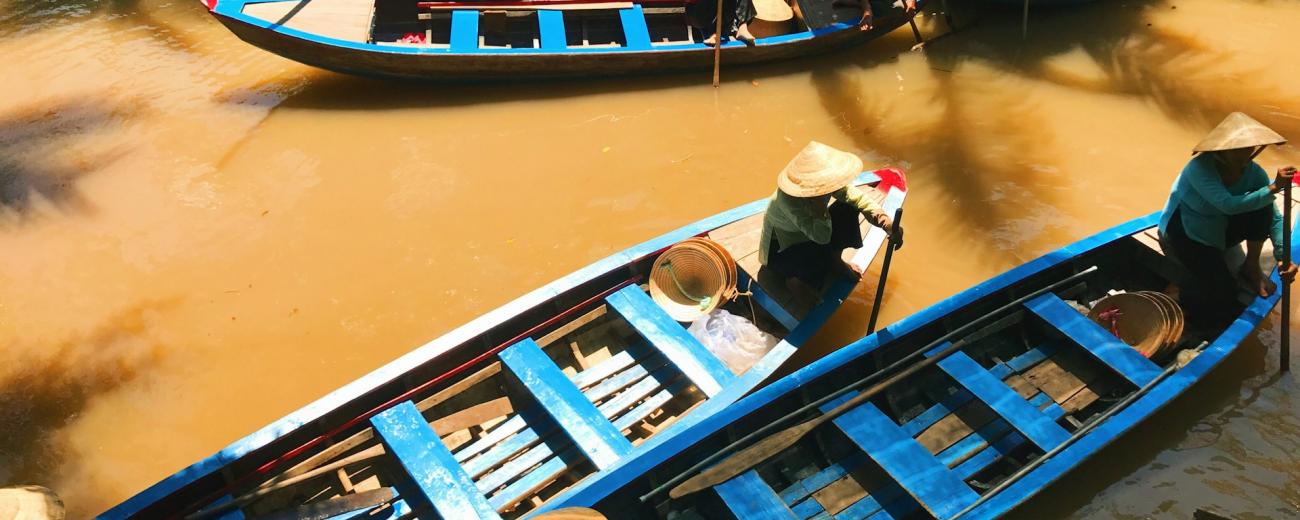Future Leaders Programme 4: Adaptive governance in the Mekong Delta


About
Future Leaders Programme 4: Adaptive governance in the context of climate change in the Mekong River Delta (MRD) region of Vietnam (10-12 July 2024, Ho Chi Minh City).
The Vietnamese Mekong River Delta (MRD) is vulnerable to rising sea levels and other negative effects of climate change that interact with other factors. Upstream dam building causes floods, decreases sediment flows and depletes fish stocks. Over-exploitation of groundwater and sand mining result in land subsidence. A changing agro-ecology, concentration of landholdings and better job opportunities in cities and industrial areas stimulate outmigration, especially of young people.
In July, DLD co-directors Christopher Cramer and Jonathan Di John led a DLD Future Leaders Programme (FLP) workshop in Ho Chi Minh City together with Vu Thanh Tu Anh and Jonathan Pincus of the Fulbright School of Public Policy and Management (FSPPM), Fulbright University Vietnam. We sought to understand how governance affects climate change adaptation and production strategies in the delta.
Charles Sabel (Columbia University) organised discussions around ideas of experimentalist governance: a form of incremental decision-making under uncertainty, where familiar problem-solving approaches have failed. It involves reversible ‘experiments’ that generate information on their workability, and that, if successful, contribute towards overall goals set by higher level authorities – goals that allow local actors autonomy in how they pursue them. The institutional forms that emerge are neither top-down nor bottom-up. They pool formal expertise and practical know-how, technical and lay knowledge. They are difficult to build and often face resistance. The classic example given in Sabel’s book with David Victor, Fixing the Climate, is the 1987 Montreal Protocol on Substances that Deplete the Ozone Layer.
The FLP brought together around 20 participants, from government institutions, universities, NGOs, and private firms to discuss the scope for experimental governance in the MRD. Participants debated the government’s policy for rice production and diversification in the delta and issues arising in a World Bank-backed programme to increase low-methane rice production. We learned of a Bên Tre association of clam exporters who, with Marine Stewardship Council (MSC) certification, are growing exports to the EU. We heard about innovations in rice production (how one Vietnamese rice variety came to win the World’s Best Rice prize) and in agricultural technology (water sensors to detect salination, oxygen generators that improve shrimp pond efficiency). There are striking examples of the ‘art of the possible’ in Vietnam, but the difficulty is how to scale them up.
Nothing encapsulated the constructive dialogue we aspire to better than the panel discussion at the end of our third day, featuring different ideas and experiences from a large rice firm, a government agricultural think tank, an agricultural technology firm, and Charles Sabel’s eloquent nudges to debate, all moderated by FSPPM’s Jonathan Pincus.
Header image credit: Anne Lin via Unsplash.
About the Future Leaders Programme
Future Leaders Programme (FLP) workshops bring together a small number of people who are expected to be in senior leadership positions in the coming years for a workshop involving lectures, discussion sessions, and debates.
Each FLP workshop has a key theme and/or regional focus and is led by presenters with a wealth of senior experience in government, academia, the private sector, civil society, and international organisations.




